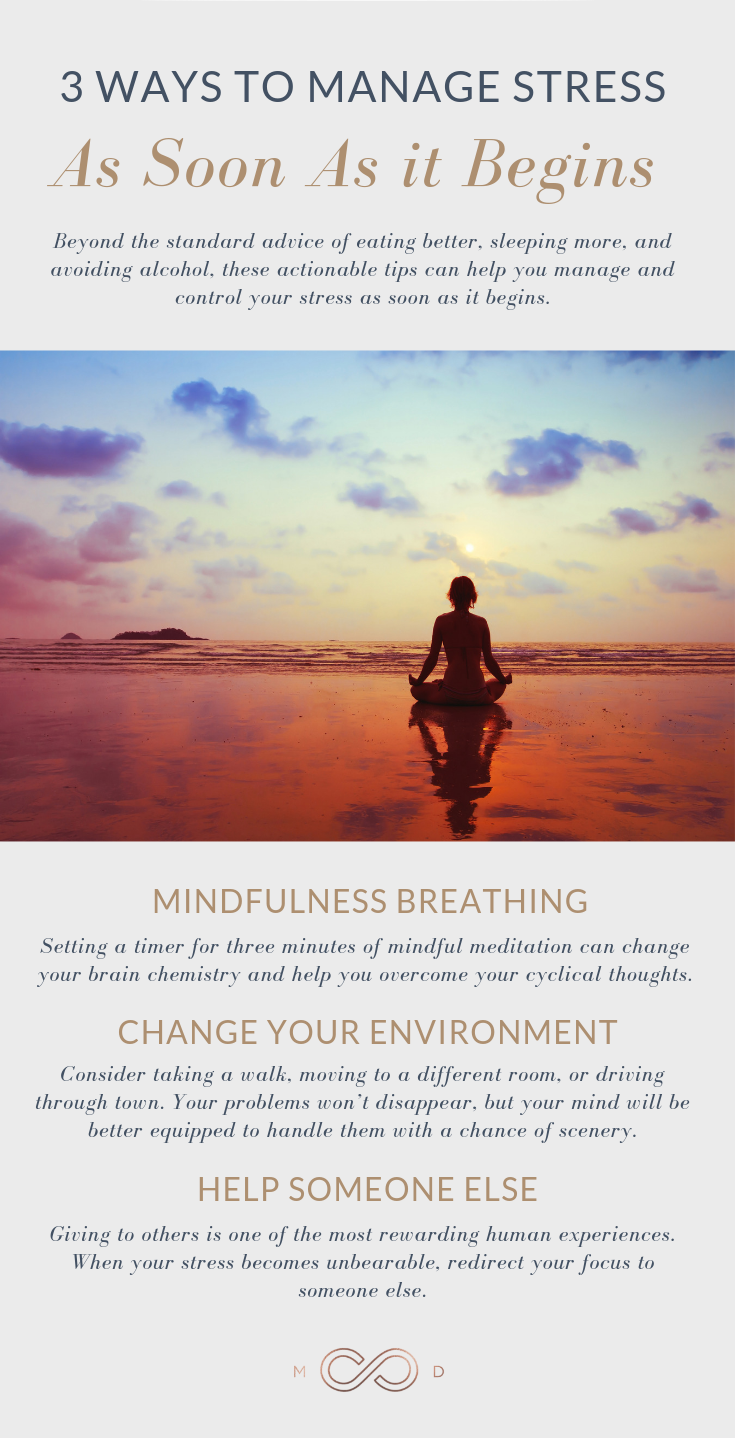Health isn’t the absence of disease; it is total physical, mental, and social wellbeing. We may expect disease, alcohol consumption, or weight gain to threaten our health, but what about stress?
The truth is that nearly 75% of all Americans experience physical and psychological symptoms of stress on a regular basis. Meanwhile, 33% of adults cope with the effects of extreme and chronic stress. So much stress makes it impossible to enjoy optimal health unless it’s properly managed and controlled.
Professionals in high profile situations are especially prone to chronic stress. They’re in positions of high visibility with devastating consequences if they fail and intense rewards if they succeed. How do these men and women thrive in stressful environments? How do they succeed instead of surrendering in defeat to overwhelming pressure?
My dear friend Dr. Hooper, a licensed clinical pastoral psychotherapist, has helped me answer some of these questions. His training with cognitive behavioral mindfulness allows him to work with people of all religions and walks of life to maximize their wholeness and wellbeing. He draws upon spiritual values and integrates psychology and ministry to help his patients overcome stress and achieve their goals.
What Is Stress?
We all intuitively understand stress, perhaps not from its formal definition but from the way it makes us feel.
Any kind of challenge to your center of balance triggers stress. Some of this imbalance, such as the rush of receiving a promotion or having a baby, is positive stress. It sends you off-balance which boosts adrenaline and energy. However, when a challenge to your homeostasis threatens to cause trouble or damage, negative stress surges.
This is why the most common definition identifies stress as physical, mental, or emotional strain or tension. It can also be described as “a condition or feeling experienced when a person perceives that demands exceed the personal and social resources the individual is able to mobilize.”
As you examine your own stress levels, envision a stress spectrum that runs from “no stress” to “overwhelming stress.”
The Stress Spectrum
Your place on the stress spectrum is always changing, even minute by minute. This can be said of all health issues. We’re always moving toward or away from disease, bouncing between the ends of the spectrum.
The physiological signs of stress don’t always manifest themselves in obvious ways. If you’re creeping toward the wrong end of the stress spectrum, you may experience these subconscious symptoms:
- Increased heart rate
- Faster breathing
- Higher Blood pressure
- Heightened sensitivity to awareness
As your stress intensifies and becomes more persistent, so do your symptoms. You may feel flush or jittery until numbness, panic, and anxiety occur. Untreated chronic stress changes the core of your blood chemistry and degrades your body over time. Just like any other disease, it must be managed and controlled before it can wreak havoc on your health.
Suboptimal stress is the opposite of the out-of-control chronic stress so many adults experience. It resembles depression but occurs as a result of being severely overstressed. Many people with suboptimal stress believe they can’t beat their stressors, so they fall into a depressed state until they can’t feel or respond to negative stimuli.
The most successful high-level performers are in touch with their own personal stress spectrums. They know their limits, how to manage and utilize their stress productively, and surround themselves with positive influences who can support them and provide help.
Manage Stress With Mindfulness and Self-Compassion
We all have crazy thoughts from time to time. Mindfulness and self-compassion are important techniques that prove you’re not an outlier. Stress and suffering are part of the human experience, so you need to be kind to yourself and understand that your thoughts don’t define you.
Dr. Hooper shared a story of his own experiences improving mindfulness and self-compassion.
“I moved from San Diego with two elderly parents in tow in 2011. I am an only child and I felt it was my responsibility to care for them. One of my parents was in the middle stages of Alzheimer’s and the other was in a wheelchair.
In the midst of settling my parents in and opening my new practice, I remember being overcome with a panic attack and severe anxiety. My thinking was going through worst case scenarios. I had to stop. I actually said out loud to myself, ‘Stop it. Come back to your breath.'”
Dr. Hooper eventually let go of his “crazy thoughts.” His story shows that mindfulness might sound simple, but we rarely have the time or space to notice our own thoughts in this busy and chaotic world. You can practice mindfulness by sitting still and focusing on your breath for three minutes. Each time your thoughts stray to a stressor, recenter to your breathing.
Self-compassion is also an essential component of stress management. You are living through a human experience and need to give yourself the same compassion you show to a neighbor or friend.
A study on Korean firefighters demonstrated the use of self-compassion and mindfulness to relieve depression. By noticing your thoughts and thinking about your thinking, you have the chance to evaluate the core of your stress. You recognize your thoughts but you don’t have to believe what you’re thinking!
The Role of Self-Esteem in Stress
Self-esteem is the reputation you build with yourself. Most of us don’t automatically associate self-esteem with stress, but the two are closely linked. People with high-esteem have the tools to manage stress more efficiently.
Every time you successfully navigate a challenge or a stressful situation, you build a stronger reputation with yourself and boost your self-esteem. Those of us with high self-esteem can encounter a painful or disappointing failure without condemning ourselves.
We can identify which choices may create a better outcome in the future. However, those of us with low self-esteem place the burden of blame entirely on ourselves. Stress and failure add fuel to the cycle of negative self-thought and low self-esteem.
If you struggle with low self-esteem, you have the opportunity to re-parent yourself into strong self-esteem using the same techniques parents can use to nurture high self-esteem in their children.
How to Nurture Self-Esteem in Your Children
You cannot give your children high self-esteem, but you can give them a supportive environment to achieve self-esteem. This doesn’t mean you should slay every dragon for your children, but instead give your children the opportunity to identify challenges and take the best steps to overcome them.
Dr. Hooper recommends this four-step system to all parents:
- Encourage
- Rescue
- Comfort
- Gently correct
Dr. Hooper uses the example of a young child petting a dog. Imagine your young child is sitting in your lap. He wants to pet the dog, so he slides off your lap and asks you for permission. You encourage him by saying, “Go ahead!” or “That’s fine.”
When the dog gets too excited and nips at your son’s fingers, you jump out of your chair and rescue and comfort your child by picking him up and kissing his hand. Finally, you gently correct your son by reminding him not to pull the dog’s tail.
This simple and intuitive process reinforces self-esteem while also internalizing that nurturing process for yourself. As Dr. Hooper explains, “We take that into ourselves and for the remainder of our lives we become our own parents.”
3 Ways to Manage Stress As Soon As it Begins
You are struggling to manage your stress and your stress always seems to have the upper-hand. You’re so focused on surviving the day without a nervous breakdown that you can’t think more than one step ahead. Sounds familiar? If so, you’re not alone.
Many highly successful people carry an invisible burden of stress through every minute of every day. Beyond the standard advice of eating better, sleeping more, and avoiding alcohol, these actionable tips can help you manage and control your stress as soon as it begins.
Mindfulness Breathing
We all know what it’s like to lie in bed at 2 AM and obsessively loop through the same worried thoughts. But have you ever fixed a problem by worrying about it? No. You can’t change what’s going on in the Universe, but you can change the way you react to it.
Setting a timer for three minutes of mindful meditation can change your brain chemistry, help you overcome your cyclical thoughts and:
- Recognize that you’re looping your thoughts and hurting yourself, not helping your stress
- Observe and acknowledge your thoughts and feelings, but know they don’t define you
- Bring focus back to each breath, in and out
This method brings to mind a football metaphor. Players practice footwork, agility, resistance, and kicking drills before every game. But the game of football isn’t just footwork, or just kicking, or just resistance. It’s a complex combination of every skill ingrained in the players’ minds.
That’s exactly how mindfulness breathing works. The more you practice these cognitive patterns, the better they become reflected in your neurology and establish automatic positive responses to stress. Mindfulness helps you realize that you are not your symptoms; you can let go of your symptoms to embrace a calmer mindset.
To learn more about the exact technique, you can find Dr. Hooper’s free guide here.
Change Your Environment
You may also alleviate your stress by changing your surroundings. Consider taking a walk, moving to a different room, or driving through town. Your problems won’t disappear, but your mind will be better equipped to handle them with a chance of scenery.
Help Someone Else
Giving to others is one of the most rewarding human experiences. When your stress becomes unbearable, redirect your focus to someone else. This may give you the perspective or space you need to realize that your sources of stress shouldn’t dictate your wellness.
High performers know how to use these strategies and separate themselves from their sources of stress. If you can learn to view a source of stress as a challenge to solve instead of a brick wall to hit, you can thrive in any situation.
Ask Yourself This Question
The true key to managing stress lies not in asking, What should I do? but in asking, How can I be with myself to accept and love who I am? Healing is a process. A deep wound isn’t just sutured at the top, it must heal from the bottom up.
Your quality of life is determined by the decisions you make, so the quickest way to manage your stress is to take action within yourself. You must change your patterns and habits if you want to see results.
If you work hard to recalibrate your internal stress “smoke alarm” so that it’s less sensitive, you won’t endure pangs of stress to unnecessary triggers. Instead, you can maintain logical thinking, speak truth to yourself, and re-parent yourself into compassion and mindfulness.
We think we know what’s important, but the truth is that most of our worries don’t matter, aren’t true, or will never happen. As Epictetus said, “People are disturbed not by things, but by their perception of a thing.” This is why humans are so brilliant yet so broken, so fragile yet so resilient.
Connect with yourself to have your feet grounded, acknowledge what is, love what you find, and stop your stress from controlling your wellbeing.

Dr. Aaron Wenzel is a concierge physician specializing in the care of fast-moving entrepreneurs, executives, and public figures in the Nashville, TN area. Dr. Wenzel’s diverse life experience and extensive training in family medicine, emergency care, nutrition, and hormone replacement therapies give him the unique platform to provide unmatched care for his patients.








